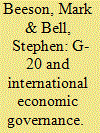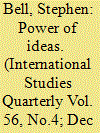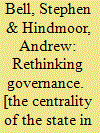| Srl | Item |
| 1 |
ID:
086433


|
|
|
|
|
| Publication |
2009.
|
| Summary/Abstract |
Following the East Asian crisis of 1997-1998, much attention was paid to financial sector reform. While little of substance has changed in the intervening years, a number of potentially important new forums were established to facilitate international cooperation. By drawing on and modifying theories of hegemony, this article provides a theoretical context within which to explore one of these institutions: the Group of 20 (G-20). The key question examined is whether institutions like the G-20 are likely to provide genuine mechanisms for cooperation and inclusion or simply become instruments of "hegemonic incorporation." The argument here is that despite the continuing "structural" dominance of the international system by the United States and the Group of 7 (G7) nations, the G-20 provides some scope for other nations to influence outcomes.
|
|
|
|
|
|
|
|
|
|
|
|
|
|
|
|
| 2 |
ID:
118169


|
|
|
|
|
| Publication |
2012.
|
| Summary/Abstract |
It is now widely accepted that the classic arguments regarding the "structural power" of business are too "structuralist." Subsequent research has focused on a widening array of independent variables that shape the variability of such power. This paper extends this research tradition, arguing that structural power theory has given insufficient attention to governmental actors, typically the targets of such power. The paper argues that ideas and the ideational processes through which government and state leaders construct threat perceptions regarding structural power can be important in mediating such power. The literature on power typically argues that power shapes ideas and disciplines target subjects. This paper revises this logic by arguing that the ideas of target subjects can also shape power. The paper's arguments then are essentially constructivist, but the paper extends such arguments by insisting on a greater role for agency than is often found in constructivist reasoning.
|
|
|
|
|
|
|
|
|
|
|
|
|
|
|
|
| 3 |
ID:
091623


|
|
|
|
|
| Publication |
Cambridge, Cambridge University Press, 2009.
|
| Description |
xv. 234p.
|
| Standard Number |
9780521712835
|
|
|
|
|
|
|
|
|
|
|
|
Copies: C:1/I:0,R:0,Q:0
Circulation
| Accession# | Call# | Current Location | Status | Policy | Location |
| 054476 | 320.1/BEL 054476 | Main | On Shelf | General | |
|
|
|
|
| 4 |
ID:
089238


|
|
|
|
|
| Publication |
2009.
|
| Summary/Abstract |
This paper explores the role of young people in development processes. This is achieved through an examination of the latest developments in literature concerning young people's identity, agency and experiences of power relations and by reflecting on our own empirical research with young people in Zambia (child-headed households) and Uganda (empowerment and sexual health). In particular, we discuss the opportunities and challenges faced by young people in terms of taking greater control over their own lives and contributing to the development of their communities. In doing so we further understanding of how young people (inter)act to improve their own lives and negotiate the challenging-and changing-realities and relationships they experience.
|
|
|
|
|
|
|
|
|
|
|
|
|
|
|
|